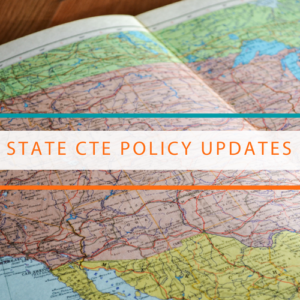Congress returned to Capitol Hill this week for a new work period this month. Lawmakers in the House have been focusing attention this week on appropriations legislation for the upcoming fiscal year while the Senate continues to consider updates to federal investments in workforce development.
 House Advances FY25 Funding Measures
House Advances FY25 Funding Measures
Both chambers of Congress returned to Capitol Hill this week, with lawmakers in the House focusing much of their attention advancing federal fiscal year 2025 (FY25) funding measures for a subset of the dozen individual spending bills that compose the entire federal budget. Nearly half of these spending measures have been marked up by appropriations leaders and are expected to be considered by the full appropriations committee and House chamber in the near future. As a reminder, Labor-HHS-ED funding bill—legislation that provides funding for the Carl D. Perkins Career and Technical Education (CTE) Act (Perkins V) and other education and workforce development priorities—is slated to be considered at the end of June. As these efforts continue to take shape, Advance CTE will continue to advocate for a robust investment in CTE via Perkins V’s state grant program.
NCES Releases Condition of Education Report
Late last week, the U.S. Department of Education’s (ED) National Center for Education Statistics (NCES) published its “Condition of Education” report– an annual publication highlighting a wide range of data and emerging trends from early education, K-12, and postsecondary levels. The annual report examines key developments in education over time throughout the education continuum. This year’s report highlighted CTE and found that students pursuing CTE courses were more likely to go to postsecondary education or training and earn credentials of value in shorter periods of time. In addition, the report highlighted significant challenges in CTE regarding shortages of qualified teachers with 31% of respondents indicating difficulties in filling open positions for these programs.
Senate to Hold WIOA Hearing Next Week
Next week the Senate Health, Education, Labor, and Pensions (HELP) Committee is scheduled to hold a hearing titled “The Workforce Innovation and Opportunity Act: Supporting Efforts to Meet the Needs of Youth, Workers, and Employers.” The hearing is expected to focus on potential updates to the Workforce Innovation and Opportunity Act (WIOA) as HELP Committee leaders continue to discuss the prospects of reauthorizing the primary federal investment in workforce development.
Read more information about the hearing
House Agriculture Committee Votes on Federal Nutrition Programs
The House Agriculture Committee held a nearly 12 hour markup recently to consider the Farm, Food, and National Security Act of 2024—legislation that would reauthorize the nation’s Farm Bill for another five year period. The measure includes major components of the Creating Access to Rural Employment and Education for Resilience and Success (CAREERS) Act (H.R. 7015)– legislation that Advance CTE endorsed earlier this year. The $1.5 trillion legislative package was advanced by the committee on a slight bipartisan basis by a margin of 33-21, with four Democrats crossing party lines to vote in favor of the proposal. The bill is expected to be further considered by the House, as the Senate considers its own proposal led by Senate Agriculture Chair Debbie Stabenow (D-MI). The current Farm Bill authorization expires this October.
 Steve Voytek, Policy Advisor
Steve Voytek, Policy Advisor


 Teacher preparation programs are an important aspect of building an educator pipeline. While recruiting and certifying CTE teachers may vary slightly depending on the state, one fact is true among all school districts and education platforms: learners, regardless of their own backgrounds, benefit from diversity among their teachers. With CTE’s pivotal role in providing real-world connections to career pathways, a diverse staff of educators elevates learners’ exposure to different approaches and links to future careers. As state directors dedicated to creating
Teacher preparation programs are an important aspect of building an educator pipeline. While recruiting and certifying CTE teachers may vary slightly depending on the state, one fact is true among all school districts and education platforms: learners, regardless of their own backgrounds, benefit from diversity among their teachers. With CTE’s pivotal role in providing real-world connections to career pathways, a diverse staff of educators elevates learners’ exposure to different approaches and links to future careers. As state directors dedicated to creating 
